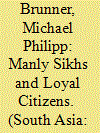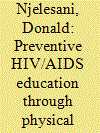| Srl | Item |
| 1 |
ID:
180008


|
|
|
|
|
| Summary/Abstract |
On 4 April 1905, during the Russo-Japanese War, Abe Isoo (1865–1949), the father of baseball in Japan, Christian intellectual, and professor of economics and political science at Waseda University, took his baseball players to the USA to play against American students and local players in California. Amidst the war and growing anti-Japanese sentiment in California, Abe realized his decade-long dream of participating in international athletic competitions in anticipation of such games contributing to the resolution of international conflicts without weapons. His two primary goals were that his students would experience “systematic scientific” baseball on its home soil and that they would broaden their international perspective. The tour marked the first school excursion sent from Japan for an overseas sporting event and also initiated Japan into the arena of international sporting competitions. This paper focuses on Abe’s view of physical education as seen in his 1905 US tour (4 April–29 June 1905).
|
|
|
|
|
|
|
|
|
|
|
|
|
|
|
|
| 2 |
ID:
157869


|
|
|
|
|
| Summary/Abstract |
This article looks at Khalsa College, the first college specifically aimed at the Sikh community in late colonial India, and its schemes for and ideals of physical culture. Despite Sikh communal and Indian national aspirations, as well as a robust transnational discourse on ‘scientific’ physical culture that was being increasingly articulated in the inter-war period, Khalsa College remained remarkably devoted to ‘modernised’ physical exercise schemes focusing on British ‘manly games’ such as football, hockey and cricket. The essay locates the reasons behind the college management's staunch loyalty to Britain and opposition to newer, radical Sikh politics; its use of images of Sikh military traditions and ‘martial manliness’, often used to demarcate Sikhism from an ‘effeminate’ Hinduism; and its specific interest—shared by the colonial authorities—in keeping the students fit for military service.
|
|
|
|
|
|
|
|
|
|
|
|
|
|
|
|
| 3 |
ID:
105405


|
|
|
|
|
| Publication |
2011.
|
| Summary/Abstract |
Governments, UN agencies and international and local ngos have mounted a concerted effort to remobilise sport as a vehicle for broad, sustainable social development. This resonates with the call for sport to be a key component in national and international development objectives. Missing in these efforts is an explicit focus on physical education within state schools, which still enrol most children in the global South. This article focuses on research into one of the few instances where physical education within the national curriculum is being revitalised as part of the growing interest in leveraging the appeal of sport and play as means to address social development challenges such as hiv/aids. It examines the response to the Zambian government's 2006 Declaration of Mandatory Physical Education (with a preventive education focus on hiv/aids) by personnel charged with its implementation and illustrates weaknesses within the education sector. The use of policy instruments such as decrees/mandates helps ensure the mainstreaming of physical education in development. However, the urgency required to respond to new mandates, particularly those sanctioned by the highest levels of government, can result in critical pieces of the puzzle being ignored, thereby undermining the potential of physical education (and sport) within development.
|
|
|
|
|
|
|
|
|
|
|
|
|
|
|
|